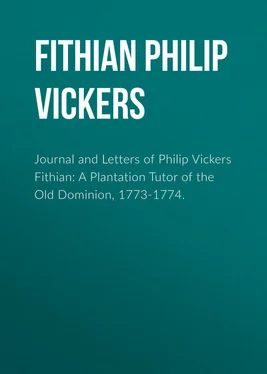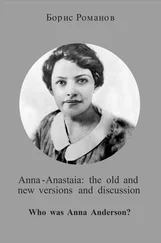Philip Fithian - Journal and Letters of Philip Vickers Fithian - A Plantation Tutor of the Old Dominion, 1773-1774.
Здесь есть возможность читать онлайн «Philip Fithian - Journal and Letters of Philip Vickers Fithian - A Plantation Tutor of the Old Dominion, 1773-1774.» — ознакомительный отрывок электронной книги совершенно бесплатно, а после прочтения отрывка купить полную версию. В некоторых случаях можно слушать аудио, скачать через торрент в формате fb2 и присутствует краткое содержание. Жанр: foreign_antique, foreign_prose, на английском языке. Описание произведения, (предисловие) а так же отзывы посетителей доступны на портале библиотеки ЛибКат.
- Название:Journal and Letters of Philip Vickers Fithian: A Plantation Tutor of the Old Dominion, 1773-1774.
- Автор:
- Жанр:
- Год:неизвестен
- ISBN:нет данных
- Рейтинг книги:3 / 5. Голосов: 1
-
Избранное:Добавить в избранное
- Отзывы:
-
Ваша оценка:
- 60
- 1
- 2
- 3
- 4
- 5
Journal and Letters of Philip Vickers Fithian: A Plantation Tutor of the Old Dominion, 1773-1774.: краткое содержание, описание и аннотация
Предлагаем к чтению аннотацию, описание, краткое содержание или предисловие (зависит от того, что написал сам автор книги «Journal and Letters of Philip Vickers Fithian: A Plantation Tutor of the Old Dominion, 1773-1774.»). Если вы не нашли необходимую информацию о книге — напишите в комментариях, мы постараемся отыскать её.
Journal and Letters of Philip Vickers Fithian: A Plantation Tutor of the Old Dominion, 1773-1774. — читать онлайн ознакомительный отрывок
Ниже представлен текст книги, разбитый по страницам. Система сохранения места последней прочитанной страницы, позволяет с удобством читать онлайн бесплатно книгу «Journal and Letters of Philip Vickers Fithian: A Plantation Tutor of the Old Dominion, 1773-1774.», без необходимости каждый раз заново искать на чём Вы остановились. Поставьте закладку, и сможете в любой момент перейти на страницу, на которой закончили чтение.
Интервал:
Закладка:
Under the custom of primogeniture, Carter arranged that the bulk of his lands, including "Corotoman," should go to his eldest son, John Carter II. He, nonetheless, saw to it that his other sons, Robert, Landon, Charles, and George should have ample estates. Robert Carter II, however, died a few months before his father, leaving a young son, Robert III, and a daughter, Elizabeth. A short time after "King" Carter's death his surviving sons procured a special legislative enactment investing the share of the estate intended for the dead son in the young grandson. When Robert Carter III reached his majority, therefore, he would become master of more than seventy thousand acres.
The young boy's uncles, John, Landon, and Charles Carter, acted as his guardians. As a result of his mother's early second marriage to Colonel John Lewis, he lived at the latter's manor plantation, "Warner Hall" in Gloucester County. When the lad was nine, he was sent to the College of William and Mary. Nothing further is definitely known of how his youth was spent.
On reaching twenty-one Robert at once began preparations for a trip to England where he remained two years. The purpose of this visit is not known. It is probable, however, that he was following the example of his grandfather, his father, and the other sons of "King" Carter who had all completed their education in the mother country. Indeed the records of the Inner Temple reveal that he was admitted to the privileges and assumed the agreeable duties of a member of that august legal society a few months after he arrived there. [22] Footnote_22_22 Cf. Jones, E. Alfred, American Members of the Inns of Court , p. 41.
Whatever his motives, though, it is unlikely that a spirited young man, possessed of ample means and free of parental restraint, would bury himself entirely within musty college walls. Reports at home had it that he spent his time in idleness and gay diversions. A portrait painted at this time by a fashionable artist, probably in the studio of Sir Joshua Reynolds, shows him arrayed in a fine doublet of silk and a high lace collar, with a mask in one hand as if to indicate he was about to hasten away to some masquerade.
Whatever his youthful follies may have been, Robert Carter possessed a gentle and thoughtful nature. As he matured, he became increasingly a serious man of business and of scholarly and cultivated tastes. Returning to Virginia in 1751, he soon married and settled down to the life of a country squire at "Nomini Hall," the manor house his father had built in Westmoreland County.
On a visit to Maryland, Carter had met Frances Anne Tasker, the sixteen-year-old daughter of one of the foremost citizens of that colony. Struck by the beauty, good sense, and fortune of the young girl, he had secured her consent to become his wife. Frances Tasker Carter was an uncommon person. Notwithstanding the numerous children she had already borne her husband when Philip Fithian entered her household, she was still beautiful, elegant, and youthful looking. She was also well-informed and frequently surprised Fithian with the breadth of her interests. Ever cheerful and agreeable, she managed the household with fine success and carefully trained her seventeen children.
Besides a handsome dowry, Frances Tasker brought her husband a family influence that proved of great assistance in both his public and private career. Benjamin Tasker, her father, who had wide commercial connections, had served for thirty-two years as a member and President of the Council of Maryland, and for a period as acting-Governor. Her mother, Anne Bladen Tasker, was the daughter of William Bladen who had been successfully Secretary and Attorney-General of that colony. Thomas Bladen, her mother's brother, a former governor of Maryland, had removed to England and become a member of Parliament for Old Sarum, where he was now in an excellent position to promote the interests of his American relatives. [23] Footnote_23_23 Sisters of Anne Bladen Tasker and Thomas Bladen had married Daniel Dulany, Samuel Ogle, and Christopher Lowndes, all men of important political and financial connections in their world.
Robert Carter led a busy life at "Nomini Hall." To utilize profitably the resources of an estate of seventy thousand acres was a task that demanded foresight and planning. He customarily cultivated as many as a dozen large plantations at once, and it was necessary that the operations on the several units be carefully integrated. Though tobacco constituted the crop of first importance on his estate, entire plantations were sometimes devoted to producing grain stuffs and supplies needed at "Nomini Hall" and on the other plantations. From time to time, too, Carter sought to develop other money crops which might supplement the constantly dwindling profits from tobacco. The preparation of new grounds to replace discarded fields constituted a laborious task that had to be coped with at intervals. He set up and equipped so many plantations that he resorted at one time to the signs of the zodiac for names for them.
Apart from the lands he himself cultivated, Carter rented or leased a large proportion of his estate to others. He developed an elaborate system of tenancy reminiscent in its principal features of the modern lien system and "share cropping." Lands were leased for varying periods under specific agreements as to the uses to be made of them, the provision of tools and other supplies by the landlord, and the proportion of the crops to be paid as rent. Other tracts were leased for a fixed money rental.
To Carter's interests as a planter and a landlord he added those of a manufacturer. When conditions made it economical or necessary to furnish his own supplies, he operated textile factories, salt works, grain mills, and bakeries to fill his own and his neighbors' needs. In his smiths's shops the simple farm implements of the time were forged and repaired, and work was also done for near-by planters. Through his wife's relations he received a one-fifth share in the Baltimore Iron Works. As part owner of this firm he produced bar and pig iron in large quantities on a commercial basis, and incidentally supplied raw materials needed on his plantations. He also carried on extensive operations as a merchant and factor. From his stores at "Nomini Hall," European manufactures and merchandise of every sort were dispensed. He owned a number of vessels which regularly carried supplies to the landings of other planters on the Virginia rivers and the Chesapeake and took their produce off their hands. Sometimes he provided these men with banking and credit facilities.
The scope of Carter's activities is indicated by the fact that at one time his slaves numbered over 500. In addition, he employed numerous white stewards, overseers, clerks, skilled craftsmen, and artisans. In a labor force so numerous and diversified the most careful adjustments in human relationships were necessary. In a very real sense Carter acted as a protector, father, physician, and court of last resort for all his people. No complaint was too insignificant to receive the master's consideration.
As part of the obligations of his station, the master of "Nomini Hall" served as a vestryman and a warden of his church in Cople Parish and performed other public duties. At the age of twenty-eight he was made a member of the governor's Council. His large estate made him eligible and his wife's uncle, Thomas Bladen, supplied the influence in England necessary to secure his appointment to this highest governing body in the colony. By virtue of belonging to the Council he also served as a colonel in the militia. As was customary, he was henceforth known as Colonel or Councillor Carter. In the latter capacity, he went twice a year to Williamsburg to advise the royal governor and to sit as a member of the General Court. For a decade after 1762 he found it pleasant and convenient to live at the Capital the greater part of the time. He acquired a residence in the town and established his wife and children there. With the outbreak of the disturbances which led to the Revolution, however, he returned with his family to "Nomini Hall" where he lived during the remainder of his active years, devoting his time to the development of his estate and the promotion of his commercial interests, the rearing of his family, and the quiet enjoyment of his scholarly and cultivated tastes. Despite his many duties, he spent much time in reading and in scientific investigation. An accomplished musician, he practiced daily on some of the numerous instruments at his home.
Читать дальшеИнтервал:
Закладка:
Похожие книги на «Journal and Letters of Philip Vickers Fithian: A Plantation Tutor of the Old Dominion, 1773-1774.»
Представляем Вашему вниманию похожие книги на «Journal and Letters of Philip Vickers Fithian: A Plantation Tutor of the Old Dominion, 1773-1774.» списком для выбора. Мы отобрали схожую по названию и смыслу литературу в надежде предоставить читателям больше вариантов отыскать новые, интересные, ещё непрочитанные произведения.
Обсуждение, отзывы о книге «Journal and Letters of Philip Vickers Fithian: A Plantation Tutor of the Old Dominion, 1773-1774.» и просто собственные мнения читателей. Оставьте ваши комментарии, напишите, что Вы думаете о произведении, его смысле или главных героях. Укажите что конкретно понравилось, а что нет, и почему Вы так считаете.












